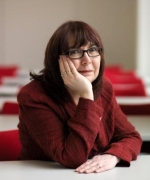Carole Goble
Department of Computer Science
University of Manchester, United Kingdom
website: http://www.cs.man.ac.uk/~carole/index.html
Presentation Title: Results may vary: what is reproducible? why do open science and  who gets the credit?
Presentation Time: Tuesday, July 23, 9:00 AM - 10:00 AM
Room: Hall 1
 
 
 
Abstract
How could we evaluate research and researchers? Reproducibility underpins the scientific method: at least in principle if not practice. The willing exchange of results and the transparent conduct of research can only be expected up to a point in a competitive environment. Contributions to science are acknowledged, but not if the credit is for data curation or software. From a bioinformatics view point, how far could our results be reproducible before the pain is just too high? Is open science a dangerous, utopian vision or a legitimate, feasible expectation? How do we move bioinformatics from one where results are post-hoc "made reproducible", to pre-hoc "born reproducible"? And why, in our computational information age, do we communicate results through fragmented, fixed documents rather than cohesive, versioned releases? I will explore these questions drawing on 20 years of experience in both the development of technical infrastructure for Life Science and the social infrastructure in which Life Science operates.
Biography
Carole Goble is a full professor in Computer Science at the University of Manchester, UK. She has an international reputation in Semantic Web, Distributed computing, and Social Computing for scientific collaboration. She is a member of the Software Sustainability Institute UK. She directs the myGrid project, which produces the widely-used open source Taverna workflow management system; myExperiment, a social web site for sharing scientific workflows; the Biocatalogue of web services for the life sciences; and the SEEK for storing, sharing and preserving Systems Biology outcomes.
In 2008 Carole was awarded the inaugural Microsoft Jim Gray award for outstanding contributions to e-Science. In 2010 she was elected a Fellow of the Royal Academy of Engineering. In 2012 she was nominated for the Benjamin Franklin award for open science in Biology.


